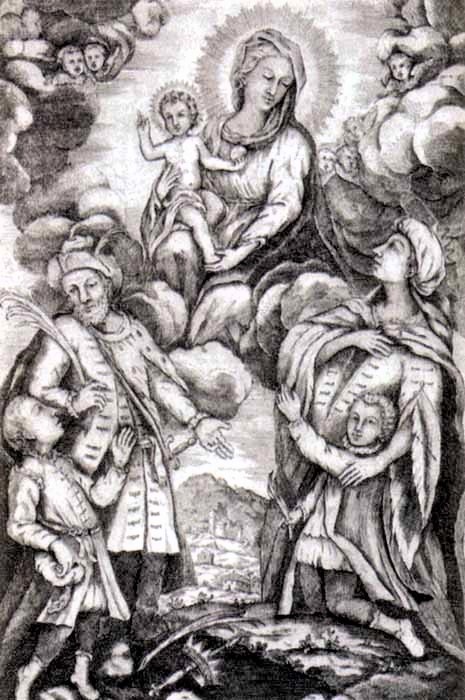January 19, 2019: SS. MARIUS, MARTHA, AUDIFAX, & ABACHUM
January 19, 2019: COMMEMORATION OF SS. MARIUS, MARTHA, AUDIFAX, AND ABACHUM, MARTYRS
For to them belongs the kingdom of heaven, who despising the life of this world, have obtained the rewards of the kingdom, and washed their garments in the blood of the lamb.
Rejoice in the Lord, and be glad ye righteous ones. And glory all ye upright of heart.
Prayer (Collect).
Give ear, O Lord, to thy people offering thee their prayers under the patronage of thy saints; and grant we may enjoy the peace of this life, and find means to obtain that which is everlasting. Through our Lord Jesus Christ, thy Son, who liveth and reigneth with thee, in the unity of the Holy Ghost, God, world without end. Amen.
Even though these holy saints lived and suffered marytrdom nearly 2,000 years ago, we would do well by recalling their holiness each year on their feastday of January 19th. It is a modern error to regard only the most recent saints or most recent events as applicable to us - we can learn from the lives of all of the saints from all times.
The following lesson is given in the office:
Marius, a Persian of noble birth, came to Rome, under the emperor Claudius, to venerate the sepulchers of the martyrs in the company of his wife Martha, a noble lady, and their two sons Audifax and Abachum. There they ministered to the Christians in prison, maintaining them both by their wealth and their own personal service, and buried the bodies of the saints. They were all accordingly arrested, and since they could not be induced by fear or threats to sacrifice to the gods, they were first beaten with clubs, then dragged about with ropes, burnt with hot iron plates and torn with hooks. Lastly their hands were cut off and tied about their necks, and they were led through the city and by the Via Cornelia to the place called Nymphe, thirteen miles from Rome, where they were put to death. The first to die was Martha, who had earnestly exhorted her husband and sons to bear their suffering with constancy for the faith of Jesus Christ. Then the others were beheaded in the same sandpit, and their bodies were thrown into the fire. Felicitas, a noble Roman matron, took them when they were half burned and buried them in her own estate.
Another account of martyrdom of this blessed family.
A.D. 270
Maris, a nobleman of Persia, with his wife Martha, and two sons, Audifax and Abachum, being converted to the faith, distributed his fortune among the poor, as the primitive Christians did at Jerusalem, and came to Rome to visit the tombs of the apostles. The emperor Aurelian then persecuted the church, and by his order a great number of Christians were shut up in the amphitheatre, and shot to death with arrows, and their bodies burnt. Our saints gathered and buried their ashes with respect; for which they were apprehended, and after many torments under the governor Marcianus, Maris and his two sons were beheaded; and Martha drowned, thirteen miles from Rome, at a place now called Santa Ninfa. Their relics were found at Rome in 1590. They are mentioned with distinction in all the western Martyrologies from the sacramentary of St. Gregory. Their relics are kept principally at Rome; part in the church of St. Adrian, part in that of St. Charles, and in that of St. John of Calybite. Eginhart, son-in-law and secretary of Charlemagne, deposited a portion of these relics, which had been sent him from Rome, in the abbey of Selghenstadt, of which he was the founder, in the diocese of Mentz.
The martyrs and confessors triumphed over the devil by prayer; by this, poor and weak as they were, they were rendered invincible, by engaging Omnipotence itself to be their comfort, strength, and protection. If the art of praying well be the art of living well, according to the received maxim of the fathers and masters of a spiritual life, nothing is certainly of greater importance, than for us to learn this heavenly art of conversing with God in the manner we ought. We admire the wonderful effects which this exercise produced in the saints, who by it were disengaged from earthly ties, and made spiritual and heavenly, perfect angels on earth; but we experience nothing of this in ourselves. Prayer was in them the channel of all graces, the means of attaining all virtues, and all the treasures of heaven. In us it is fruitless: the reason is plain; for the promises of Christ cannot fail: we ask, and receive not, because we ask amiss.
Taken from: The Liturgical Year – Christmas, Vol. II, Edition 1868;
The
Lives of the Fathers, Martyrs, and Other Principal Saints, Vol. I, 1903; and
The Divine Office for the use of the Laity, Volume I, 1806.
Also Read – January 19, 2019: St. Canute, King of Denmark, Martyr.
Ss. Marius, Martha, Audifax, and Abachum, pray for us.
